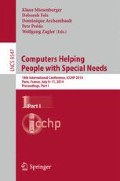Abstract
Emotions are related with many key cognitive processes during human computer interaction (HCI). The aim of this study was to validate usability recommendations depending on user profile, to check the effect of the emotional state on HCI and to compare physiological response analysis and questionnaires. 10 control users and 10 users with upper limb disorders were involved. An orthogonal design with seven usability parameters were used to generate 16 websites with different styles but with the same content. Galvanic skin response and facial electromyography on the corrugator supercilii and zygomaticus major muscles were used to assess emotional response, which are related to arousal and valence respectively; and user opinion was collected using a questionnaire. The results showed significant correlations between questionnaires and physiological signals, which are more sensitive to web parameters effect; and most of usability recommendations improve usability but only have a significant influence on users with motor disorders.
Access this chapter
Tax calculation will be finalised at checkout
Purchases are for personal use only
Preview
Unable to display preview. Download preview PDF.
References
Lam, J., Lee, M.: Bridging the Digital Divide-The Roles of Internet Self-Efficacy towards Learning Computer and the Internet among Elderly in Hong Kong, China. In: Proc. of the 38th Annual Hawaii International Conference on En System Sciences, HICSS 2005, pp. 266b–266b (2005)
Belda-Lois, J., Helios de-Rosario, R.P., Poveda, R., Morón, A., Porcar, R., Gómez, A.: Can human movement analysis contribute to usability understanding? Human Movement Science 29(4), 529–541 (2010)
Nasoz, F., Lisetti, C.L., Alvarez, K., Finkelstein, N.: Emotion recognition from physiological signals for user modeling of affect. In: Proc. 3rd Workshop on Affective and Attitude User Modeling, Pittsburgh, PA, USA (2003)
Ward, R.D., Marsden, P.H.: Physiological responses to different WEB page designs. International Journal of Human-Computer Studies 59(1), 199–212 (2003)
Laparra-Hernández, J., Belda-Lois, J.M., Medina, E., Campos, N., Poveda, R.: EMG and GSR signals for evaluating user’s perception of different types of ceramic flooring. International Journal of Industrial Ergonomics 39(2), 326–332 (2009)
Laparra-Hernández, J., Belda-Lois, J.M., Díaz Pineda, J.: Page A. A multimodal web usability assessment based on traditional metrics, physiological response and eye-tracking analysis. In: Gamito, P.S.P. (ed.) I See Me, You See Me: Inferring Cognitive and Emotional Processes from Gazing Behaviour, ch. 6, Cambridge Scholars Publishing (2014)
Author information
Authors and Affiliations
Editor information
Editors and Affiliations
Rights and permissions
Copyright information
© 2014 Springer International Publishing Switzerland
About this paper
Cite this paper
Laparra-Hernández, J., Belda-Lois, JM., Page, Á., Ferreras Remesal, A. (2014). Influence of Emotions on Web Usability for Users with Motor Disorders. In: Miesenberger, K., Fels, D., Archambault, D., Peňáz, P., Zagler, W. (eds) Computers Helping People with Special Needs. ICCHP 2014. Lecture Notes in Computer Science, vol 8547. Springer, Cham. https://doi.org/10.1007/978-3-319-08596-8_40
Download citation
DOI: https://doi.org/10.1007/978-3-319-08596-8_40
Publisher Name: Springer, Cham
Print ISBN: 978-3-319-08595-1
Online ISBN: 978-3-319-08596-8
eBook Packages: Computer ScienceComputer Science (R0)

